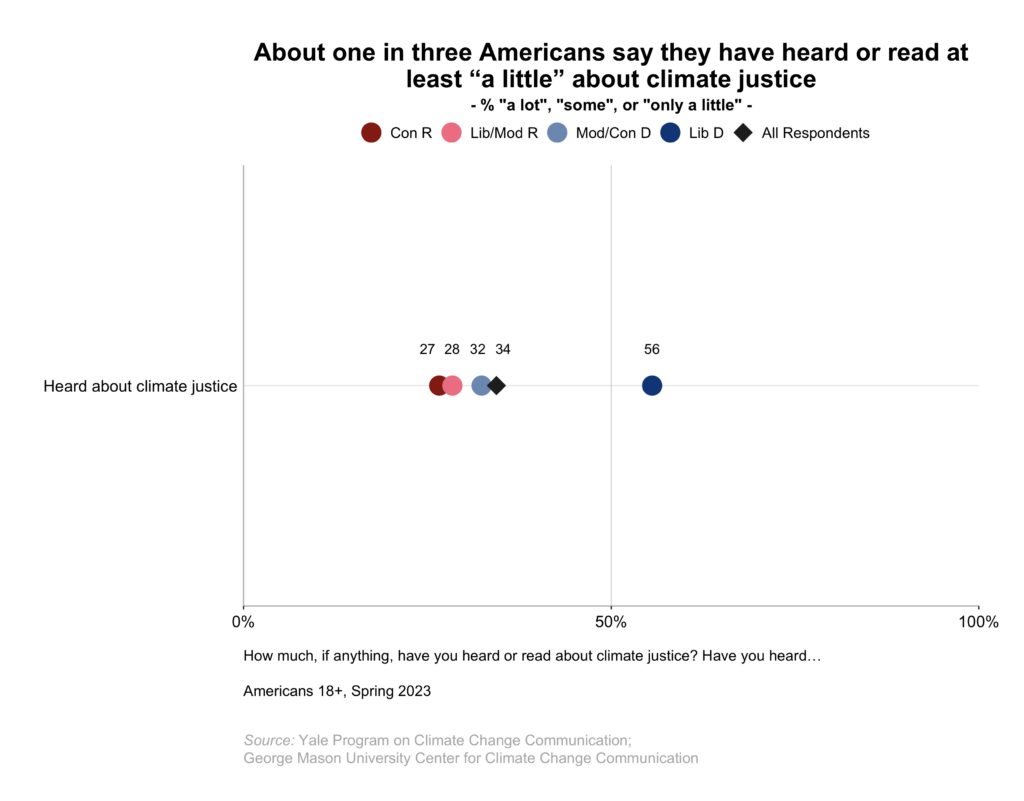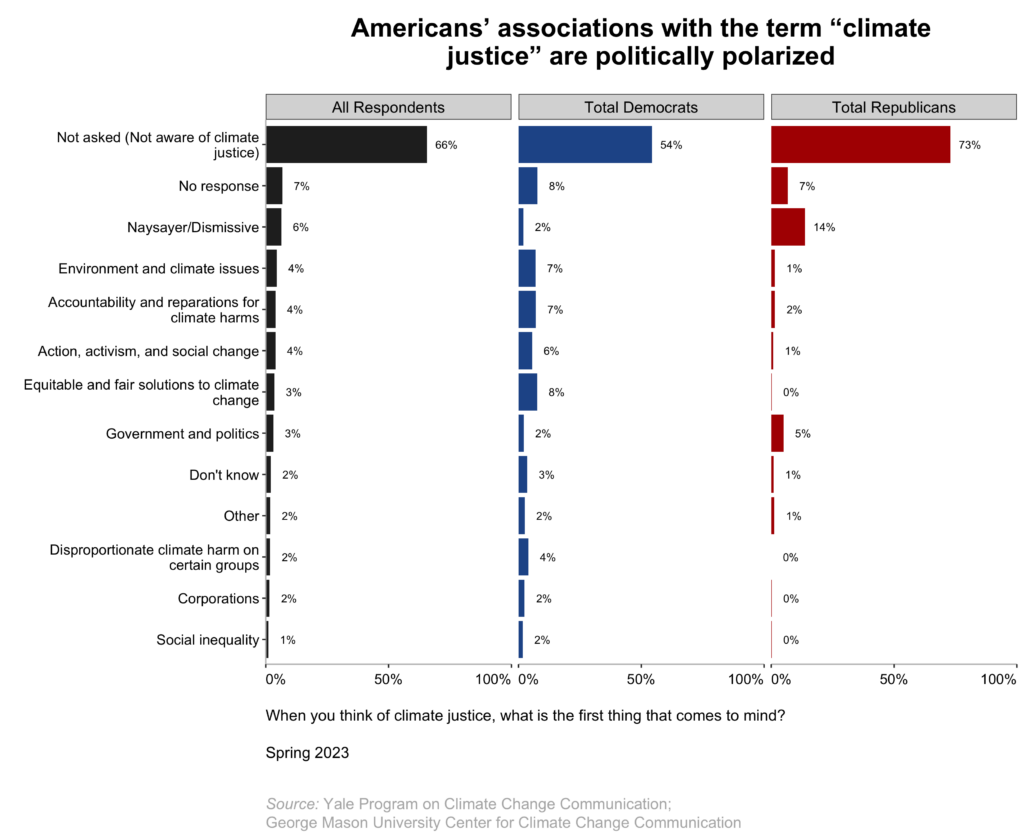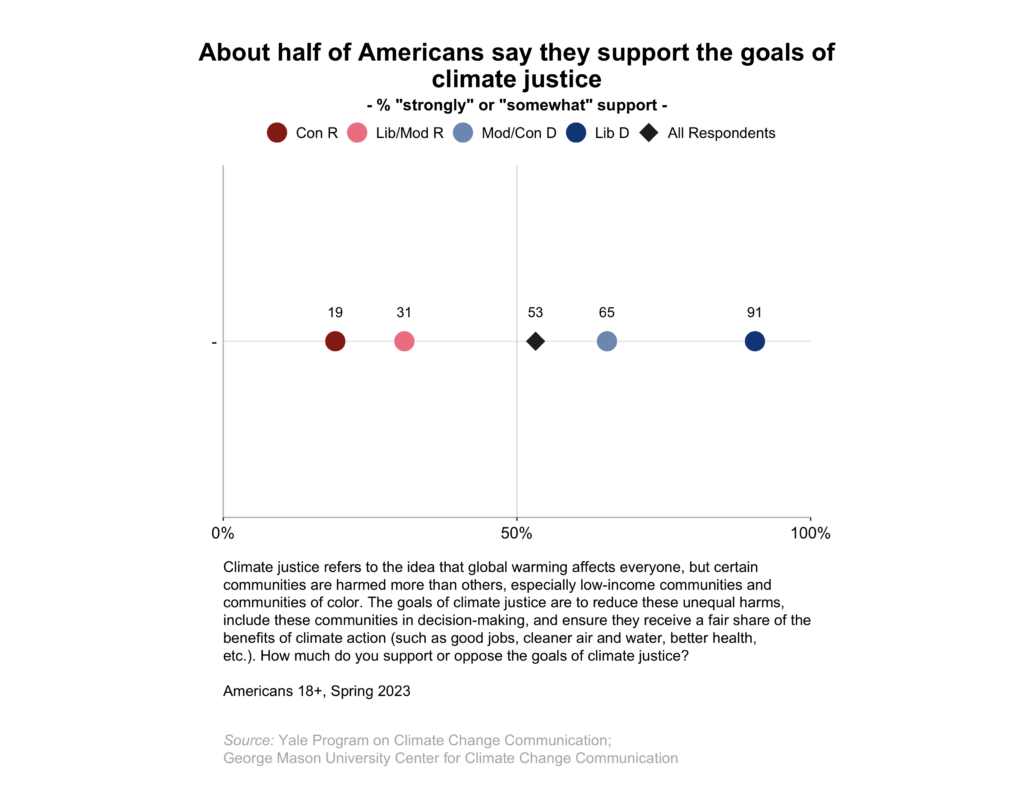Report · Sep 12, 2023
Climate Change in the American Mind: Climate Justice, Spring 2023
By Jennifer Carman, Matthew Ballew, Danning (Leilani) Lu, Anthony Leiserowitz, Edward Maibach, Seth Rosenthal, John Kotcher, Emily Goddard, Joshua Low, Jennifer Marlon, Marija Verner, Sanguk Lee, Teresa Myers, Matthew Goldberg, Nicholas Badullovich, Tracy Mason, Andrea Aguilar, Sha Merirei Ongelungel, Karina Sahlin, Cristian Sanchez, Irene Burga, Mark Magaña, Saad Amer, Romona Taylor Williams, Montana Burgess, Grace McRae, Makeda Fekede, Manuel Salgado, Annika Larson, Kristin Barendregt-Ludwig, Michel Gelobter and Gerald Torres
Filed under: Beliefs & Attitudes
2. Americans’ Beliefs and Attitudes About Climate Justice
2.1. About one in three Americans say they have heard or read at least “a little” about climate justice. About two in three Americans say they have not.
About one in three Americans (34%) say they have heard or read at least “a little” about climate justice, while most Americans say they have heard “nothing at all” (65%) about it (refer to data tables, p. 24). A majority of liberal Democrats say they have heard or read at least “a little” about climate justice (56%), but only about three in ten moderate/conservative Democrats (32%), liberal/moderate Republicans (28%), and conservative Republicans (27%) say they have heard or read anything about it.

2.2. Americans’ associations with the term “climate justice” are politically polarized.
As noted in Section 2.1, 34% of Americans say they have heard at least “a little” about climate justice. All survey participants who said they had heard at least “a little” were then asked the open-ended question: “What, if anything, is the first thing that comes to mind when you think about climate justice?” Responses to that question were then categorized for analysis (refer to data tables, p. 25; for descriptions of all categories, see pp. 32–33).
For Americans who have heard about climate justice and provided a response, the most common association reflected dismissive attitudes (e.g., it is a hoax, it is government waste; 6%). The next most common associations were environmental and climate issues generally (e.g., reducing pollution, renewable energy; 4%) and accountability and reparations for climate harms (e.g., forcing polluters to pay for climate damages; 4%). Additionally, some Americans said they have heard about climate justice (section 2.1), but did not provide a response to this open-ended question (i.e., did not describe any particular concept they associate with climate justice, 7%).
Among the political groups, the most common associations among Democrats were equitable and fair solutions to climate change (e.g., protecting vulnerable communities from climate impacts; 8%) and accountability and reparations for climate harms (7%). The most common associations among Republicans were naysayer/dismissive responses (14%).

2.3. About half of Americans say they support the goals of climate justice.
After reading a brief description of climate justice, about half of Americans (53%) say they support its goals (31% “strongly support” and 22% “somewhat support”; refer to data tables, p. 25). Support is divided along political lines: A large majority of liberal Democrats (91%) and about two in three moderate/conservative Democrats (65%) say they support the goals of climate justice, but only about three in ten liberal/moderate Republicans (31%) and two in ten conservative Republicans (19%) say so. About one in four Americans (26%) say they “neither support nor oppose” the goals of climate justice, and 19% say they oppose them (including 14% who “strongly oppose” them; refer to data tables).
